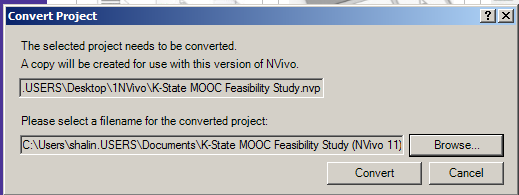
NVivo supports data formats such as audio files, videos, digital photos, Word, PDF, spreadsheets, rich text, plain text and web and social media data. NVivo accommodates a wide range of research methods, including network and organizational analysis, action or evidence-based research, discourse analysis, grounded theory, conversation analysis, ethnography, literature reviews, phenomenology, mixed methods research and the Framework methodology.
#Nvivo version software#
They can make notes in the software using memos and build a body of evidence to support their case or project. The researcher or analyst can identify trends and cross-examine information in a multitude of ways using its search engine and query functions. The software allows users to classify, sort and arrange information examine relationships in the data and combine analysis with linking, shaping, searching and modeling. NVivo is intended to help users organize and analyze non-numerical or unstructured data. In 1999, the Richards developed the first version of NVivo and eventually N6 was replaced by NVivo 7. Originally called NUD*IST, it contained tools for fine and detailed analysis of unstructured textual data. The first QSR International software product was developed by Tom and Lyn Richards. NVivo is used predominantly by academic, government, health and commercial researchers across a diverse range of fields, including social sciences such as anthropology, psychology, communication, sociology, as well as fields such as forensics, tourism, criminology and marketing. NVivo helps qualitative researchers to organize, analyze and find insights in unstructured or qualitative data like interviews, open-ended survey responses, journal articles, social media and web content, where deep levels of analysis on small or large volumes of data are required.

NVivo is a qualitative data analysis (QDA) computer software package produced by QSR International.


 0 kommentar(er)
0 kommentar(er)
